Entrepreneurship and Small Business: Analysis and Evaluation Report
VerifiedAdded on 2020/07/23
|18
|5725
|51
Report
AI Summary
This report delves into the multifaceted world of entrepreneurship and small businesses. It begins by defining entrepreneurship and small businesses, then explores various types of entrepreneurial ventures, differentiating between small business entrepreneurship, scalable start-up entrepreneurship, large company entrepreneurship, and social entrepreneurship. The report then examines the similarities and differences between these ventures, focusing on goals, mindset, value creation, and marketing communication. Furthermore, it presents relevant data and statistics to illustrate the significant impact of micro and small businesses on the UK economy, including their contributions to turnover, employment, and growth. The report also highlights the importance of small businesses and start-ups in fostering the growth of the social economy, along with an analysis of the characteristic traits and skills of successful entrepreneurs, using Richard Branson as an example to illustrate entrepreneurial personality, motivation, and mindset. Finally, it discusses how background and experience can sometimes hinder entrepreneurial endeavors. The report concludes by summarizing key findings and insights, supported by cited references.

Entrepreneurship and
Small Business
Small Business
Paraphrase This Document
Need a fresh take? Get an instant paraphrase of this document with our AI Paraphraser
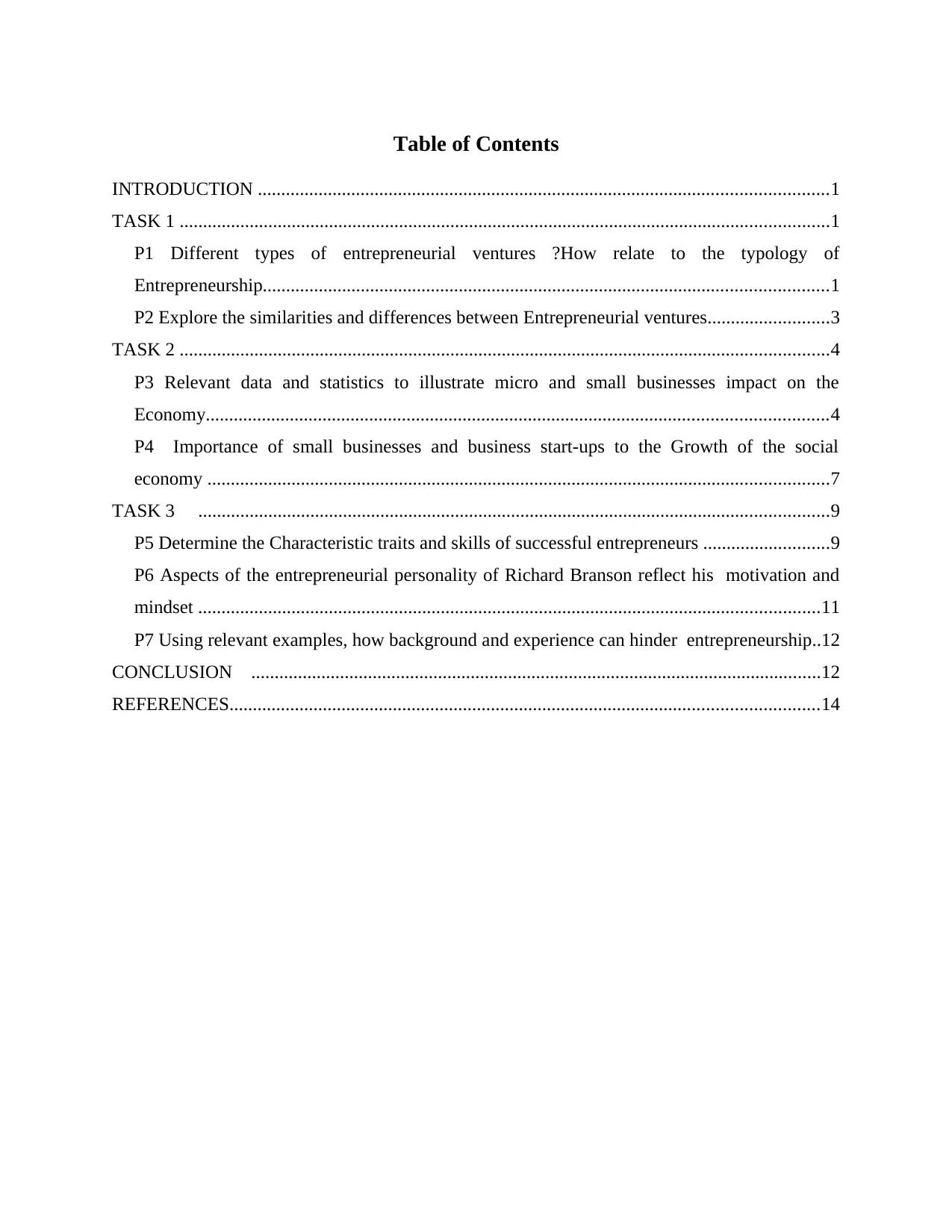
Table of Contents
INTRODUCTION ..........................................................................................................................1
TASK 1 ...........................................................................................................................................1
P1 Different types of entrepreneurial ventures ?How relate to the typology of
Entrepreneurship.........................................................................................................................1
P2 Explore the similarities and differences between Entrepreneurial ventures..........................3
TASK 2 ...........................................................................................................................................4
P3 Relevant data and statistics to illustrate micro and small businesses impact on the
Economy.....................................................................................................................................4
P4 Importance of small businesses and business start-ups to the Growth of the social
economy .....................................................................................................................................7
TASK 3 .......................................................................................................................................9
P5 Determine the Characteristic traits and skills of successful entrepreneurs ...........................9
P6 Aspects of the entrepreneurial personality of Richard Branson reflect his motivation and
mindset .....................................................................................................................................11
P7 Using relevant examples, how background and experience can hinder entrepreneurship..12
CONCLUSION ..........................................................................................................................12
REFERENCES..............................................................................................................................14
INTRODUCTION ..........................................................................................................................1
TASK 1 ...........................................................................................................................................1
P1 Different types of entrepreneurial ventures ?How relate to the typology of
Entrepreneurship.........................................................................................................................1
P2 Explore the similarities and differences between Entrepreneurial ventures..........................3
TASK 2 ...........................................................................................................................................4
P3 Relevant data and statistics to illustrate micro and small businesses impact on the
Economy.....................................................................................................................................4
P4 Importance of small businesses and business start-ups to the Growth of the social
economy .....................................................................................................................................7
TASK 3 .......................................................................................................................................9
P5 Determine the Characteristic traits and skills of successful entrepreneurs ...........................9
P6 Aspects of the entrepreneurial personality of Richard Branson reflect his motivation and
mindset .....................................................................................................................................11
P7 Using relevant examples, how background and experience can hinder entrepreneurship..12
CONCLUSION ..........................................................................................................................12
REFERENCES..............................................................................................................................14
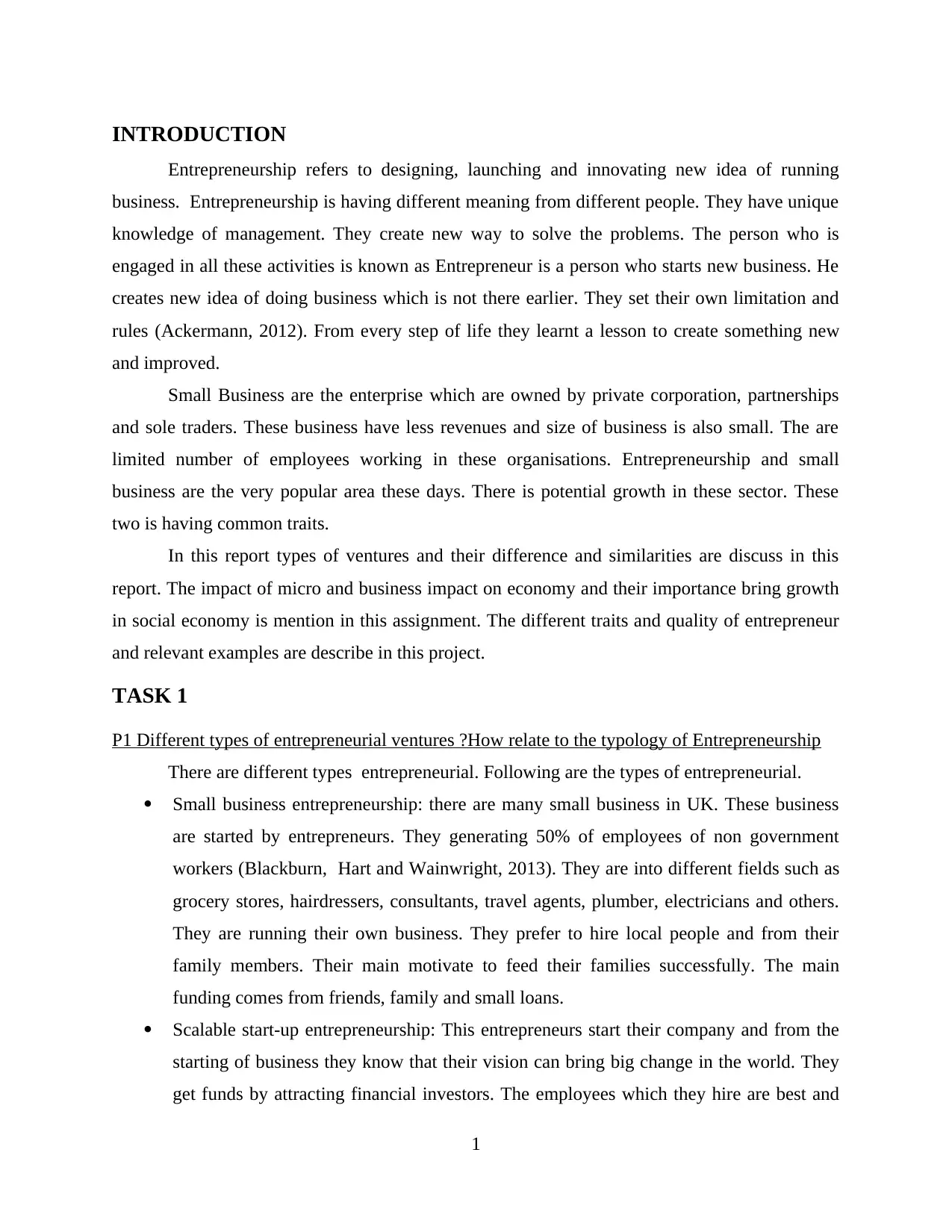
INTRODUCTION
Entrepreneurship refers to designing, launching and innovating new idea of running
business. Entrepreneurship is having different meaning from different people. They have unique
knowledge of management. They create new way to solve the problems. The person who is
engaged in all these activities is known as Entrepreneur is a person who starts new business. He
creates new idea of doing business which is not there earlier. They set their own limitation and
rules (Ackermann, 2012). From every step of life they learnt a lesson to create something new
and improved.
Small Business are the enterprise which are owned by private corporation, partnerships
and sole traders. These business have less revenues and size of business is also small. The are
limited number of employees working in these organisations. Entrepreneurship and small
business are the very popular area these days. There is potential growth in these sector. These
two is having common traits.
In this report types of ventures and their difference and similarities are discuss in this
report. The impact of micro and business impact on economy and their importance bring growth
in social economy is mention in this assignment. The different traits and quality of entrepreneur
and relevant examples are describe in this project.
TASK 1
P1 Different types of entrepreneurial ventures ?How relate to the typology of Entrepreneurship
There are different types entrepreneurial. Following are the types of entrepreneurial.
Small business entrepreneurship: there are many small business in UK. These business
are started by entrepreneurs. They generating 50% of employees of non government
workers (Blackburn, Hart and Wainwright, 2013). They are into different fields such as
grocery stores, hairdressers, consultants, travel agents, plumber, electricians and others.
They are running their own business. They prefer to hire local people and from their
family members. Their main motivate to feed their families successfully. The main
funding comes from friends, family and small loans.
Scalable start-up entrepreneurship: This entrepreneurs start their company and from the
starting of business they know that their vision can bring big change in the world. They
get funds by attracting financial investors. The employees which they hire are best and
1
Entrepreneurship refers to designing, launching and innovating new idea of running
business. Entrepreneurship is having different meaning from different people. They have unique
knowledge of management. They create new way to solve the problems. The person who is
engaged in all these activities is known as Entrepreneur is a person who starts new business. He
creates new idea of doing business which is not there earlier. They set their own limitation and
rules (Ackermann, 2012). From every step of life they learnt a lesson to create something new
and improved.
Small Business are the enterprise which are owned by private corporation, partnerships
and sole traders. These business have less revenues and size of business is also small. The are
limited number of employees working in these organisations. Entrepreneurship and small
business are the very popular area these days. There is potential growth in these sector. These
two is having common traits.
In this report types of ventures and their difference and similarities are discuss in this
report. The impact of micro and business impact on economy and their importance bring growth
in social economy is mention in this assignment. The different traits and quality of entrepreneur
and relevant examples are describe in this project.
TASK 1
P1 Different types of entrepreneurial ventures ?How relate to the typology of Entrepreneurship
There are different types entrepreneurial. Following are the types of entrepreneurial.
Small business entrepreneurship: there are many small business in UK. These business
are started by entrepreneurs. They generating 50% of employees of non government
workers (Blackburn, Hart and Wainwright, 2013). They are into different fields such as
grocery stores, hairdressers, consultants, travel agents, plumber, electricians and others.
They are running their own business. They prefer to hire local people and from their
family members. Their main motivate to feed their families successfully. The main
funding comes from friends, family and small loans.
Scalable start-up entrepreneurship: This entrepreneurs start their company and from the
starting of business they know that their vision can bring big change in the world. They
get funds by attracting financial investors. The employees which they hire are best and
1
⊘ This is a preview!⊘
Do you want full access?
Subscribe today to unlock all pages.

Trusted by 1+ million students worldwide
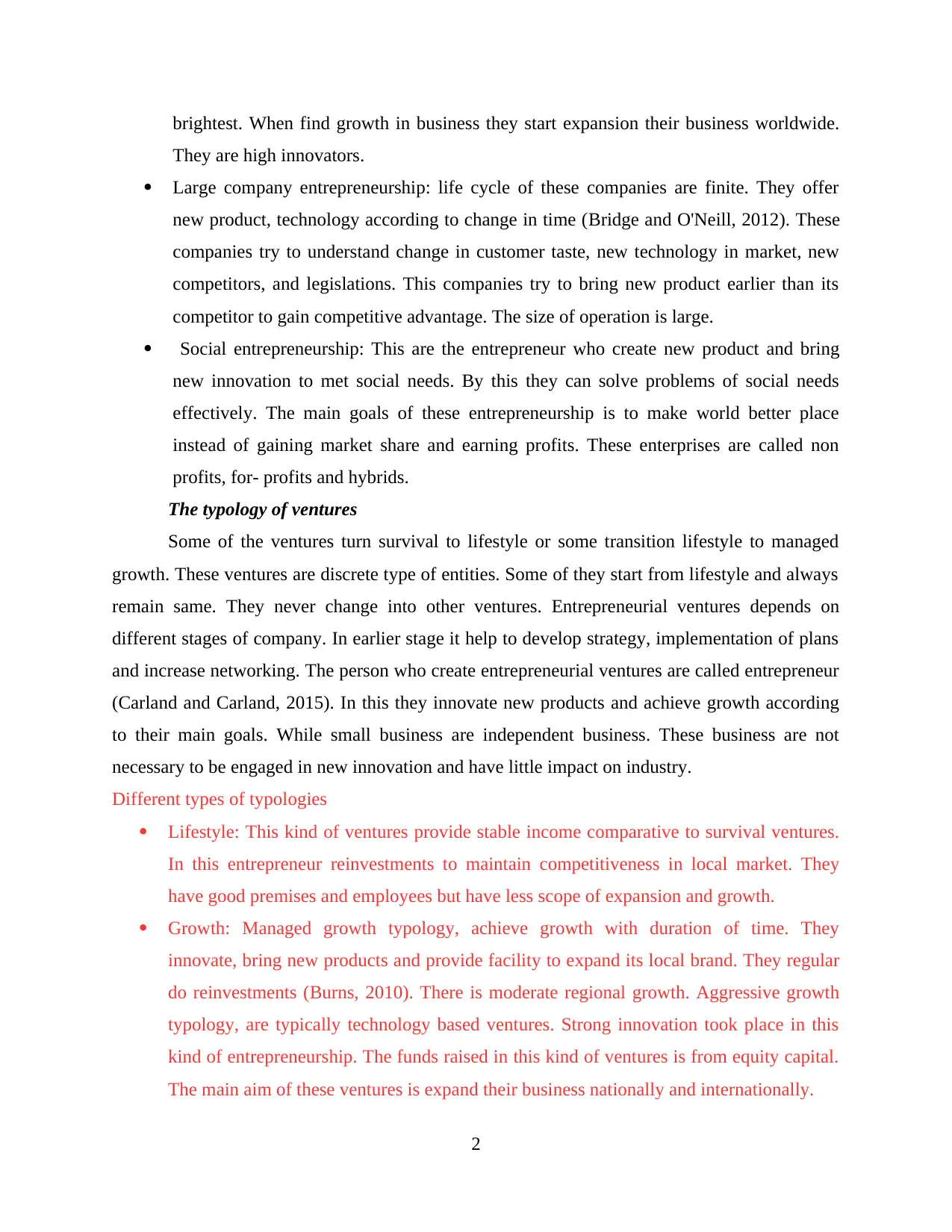
brightest. When find growth in business they start expansion their business worldwide.
They are high innovators.
Large company entrepreneurship: life cycle of these companies are finite. They offer
new product, technology according to change in time (Bridge and O'Neill, 2012). These
companies try to understand change in customer taste, new technology in market, new
competitors, and legislations. This companies try to bring new product earlier than its
competitor to gain competitive advantage. The size of operation is large.
Social entrepreneurship: This are the entrepreneur who create new product and bring
new innovation to met social needs. By this they can solve problems of social needs
effectively. The main goals of these entrepreneurship is to make world better place
instead of gaining market share and earning profits. These enterprises are called non
profits, for- profits and hybrids.
The typology of ventures
Some of the ventures turn survival to lifestyle or some transition lifestyle to managed
growth. These ventures are discrete type of entities. Some of they start from lifestyle and always
remain same. They never change into other ventures. Entrepreneurial ventures depends on
different stages of company. In earlier stage it help to develop strategy, implementation of plans
and increase networking. The person who create entrepreneurial ventures are called entrepreneur
(Carland and Carland, 2015). In this they innovate new products and achieve growth according
to their main goals. While small business are independent business. These business are not
necessary to be engaged in new innovation and have little impact on industry.
Different types of typologies
Lifestyle: This kind of ventures provide stable income comparative to survival ventures.
In this entrepreneur reinvestments to maintain competitiveness in local market. They
have good premises and employees but have less scope of expansion and growth.
Growth: Managed growth typology, achieve growth with duration of time. They
innovate, bring new products and provide facility to expand its local brand. They regular
do reinvestments (Burns, 2010). There is moderate regional growth. Aggressive growth
typology, are typically technology based ventures. Strong innovation took place in this
kind of entrepreneurship. The funds raised in this kind of ventures is from equity capital.
The main aim of these ventures is expand their business nationally and internationally.
2
They are high innovators.
Large company entrepreneurship: life cycle of these companies are finite. They offer
new product, technology according to change in time (Bridge and O'Neill, 2012). These
companies try to understand change in customer taste, new technology in market, new
competitors, and legislations. This companies try to bring new product earlier than its
competitor to gain competitive advantage. The size of operation is large.
Social entrepreneurship: This are the entrepreneur who create new product and bring
new innovation to met social needs. By this they can solve problems of social needs
effectively. The main goals of these entrepreneurship is to make world better place
instead of gaining market share and earning profits. These enterprises are called non
profits, for- profits and hybrids.
The typology of ventures
Some of the ventures turn survival to lifestyle or some transition lifestyle to managed
growth. These ventures are discrete type of entities. Some of they start from lifestyle and always
remain same. They never change into other ventures. Entrepreneurial ventures depends on
different stages of company. In earlier stage it help to develop strategy, implementation of plans
and increase networking. The person who create entrepreneurial ventures are called entrepreneur
(Carland and Carland, 2015). In this they innovate new products and achieve growth according
to their main goals. While small business are independent business. These business are not
necessary to be engaged in new innovation and have little impact on industry.
Different types of typologies
Lifestyle: This kind of ventures provide stable income comparative to survival ventures.
In this entrepreneur reinvestments to maintain competitiveness in local market. They
have good premises and employees but have less scope of expansion and growth.
Growth: Managed growth typology, achieve growth with duration of time. They
innovate, bring new products and provide facility to expand its local brand. They regular
do reinvestments (Burns, 2010). There is moderate regional growth. Aggressive growth
typology, are typically technology based ventures. Strong innovation took place in this
kind of entrepreneurship. The funds raised in this kind of ventures is from equity capital.
The main aim of these ventures is expand their business nationally and internationally.
2
Paraphrase This Document
Need a fresh take? Get an instant paraphrase of this document with our AI Paraphraser
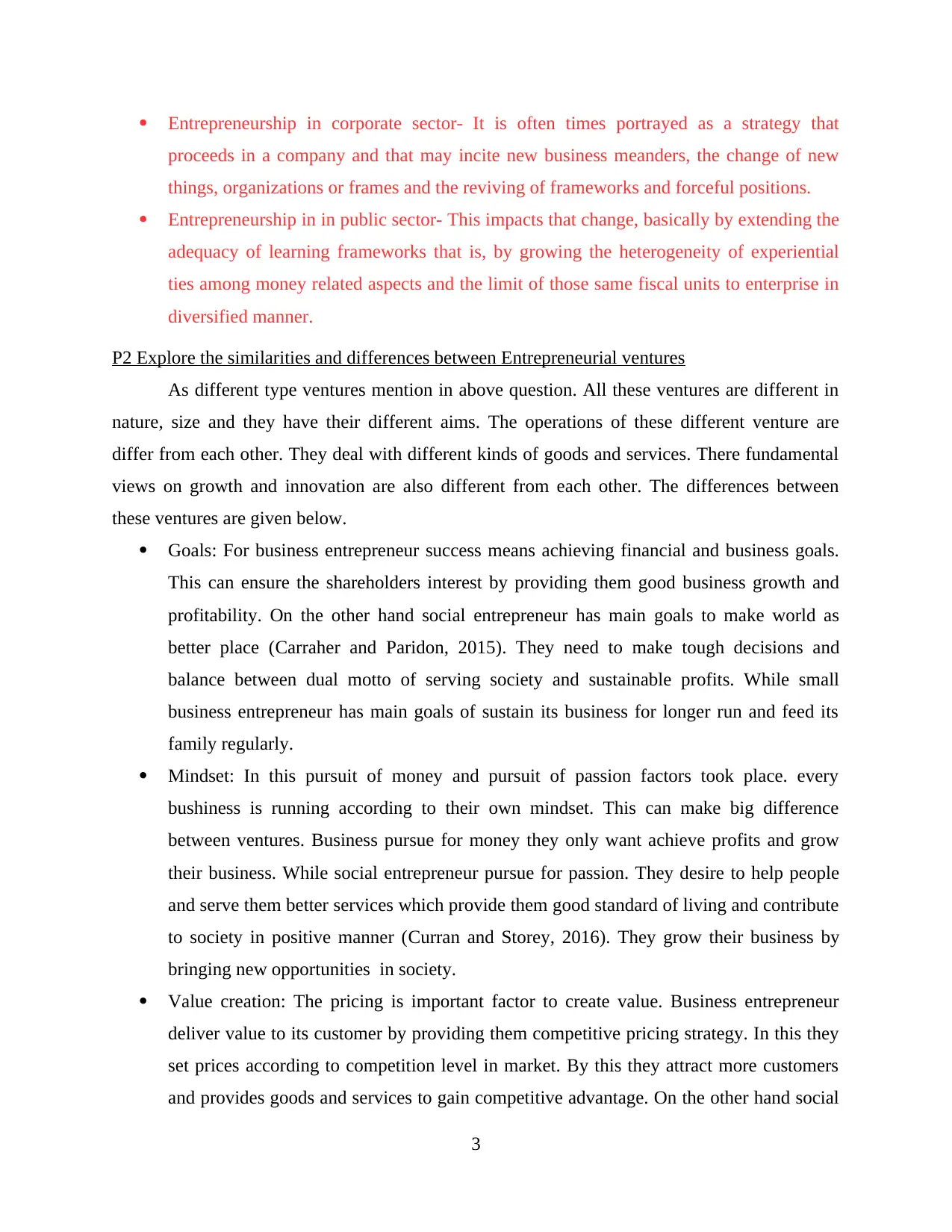
Entrepreneurship in corporate sector- It is often times portrayed as a strategy that
proceeds in a company and that may incite new business meanders, the change of new
things, organizations or frames and the reviving of frameworks and forceful positions.
Entrepreneurship in in public sector- This impacts that change, basically by extending the
adequacy of learning frameworks that is, by growing the heterogeneity of experiential
ties among money related aspects and the limit of those same fiscal units to enterprise in
diversified manner.
P2 Explore the similarities and differences between Entrepreneurial ventures
As different type ventures mention in above question. All these ventures are different in
nature, size and they have their different aims. The operations of these different venture are
differ from each other. They deal with different kinds of goods and services. There fundamental
views on growth and innovation are also different from each other. The differences between
these ventures are given below.
Goals: For business entrepreneur success means achieving financial and business goals.
This can ensure the shareholders interest by providing them good business growth and
profitability. On the other hand social entrepreneur has main goals to make world as
better place (Carraher and Paridon, 2015). They need to make tough decisions and
balance between dual motto of serving society and sustainable profits. While small
business entrepreneur has main goals of sustain its business for longer run and feed its
family regularly.
Mindset: In this pursuit of money and pursuit of passion factors took place. every
bushiness is running according to their own mindset. This can make big difference
between ventures. Business pursue for money they only want achieve profits and grow
their business. While social entrepreneur pursue for passion. They desire to help people
and serve them better services which provide them good standard of living and contribute
to society in positive manner (Curran and Storey, 2016). They grow their business by
bringing new opportunities in society.
Value creation: The pricing is important factor to create value. Business entrepreneur
deliver value to its customer by providing them competitive pricing strategy. In this they
set prices according to competition level in market. By this they attract more customers
and provides goods and services to gain competitive advantage. On the other hand social
3
proceeds in a company and that may incite new business meanders, the change of new
things, organizations or frames and the reviving of frameworks and forceful positions.
Entrepreneurship in in public sector- This impacts that change, basically by extending the
adequacy of learning frameworks that is, by growing the heterogeneity of experiential
ties among money related aspects and the limit of those same fiscal units to enterprise in
diversified manner.
P2 Explore the similarities and differences between Entrepreneurial ventures
As different type ventures mention in above question. All these ventures are different in
nature, size and they have their different aims. The operations of these different venture are
differ from each other. They deal with different kinds of goods and services. There fundamental
views on growth and innovation are also different from each other. The differences between
these ventures are given below.
Goals: For business entrepreneur success means achieving financial and business goals.
This can ensure the shareholders interest by providing them good business growth and
profitability. On the other hand social entrepreneur has main goals to make world as
better place (Carraher and Paridon, 2015). They need to make tough decisions and
balance between dual motto of serving society and sustainable profits. While small
business entrepreneur has main goals of sustain its business for longer run and feed its
family regularly.
Mindset: In this pursuit of money and pursuit of passion factors took place. every
bushiness is running according to their own mindset. This can make big difference
between ventures. Business pursue for money they only want achieve profits and grow
their business. While social entrepreneur pursue for passion. They desire to help people
and serve them better services which provide them good standard of living and contribute
to society in positive manner (Curran and Storey, 2016). They grow their business by
bringing new opportunities in society.
Value creation: The pricing is important factor to create value. Business entrepreneur
deliver value to its customer by providing them competitive pricing strategy. In this they
set prices according to competition level in market. By this they attract more customers
and provides goods and services to gain competitive advantage. On the other hand social
3
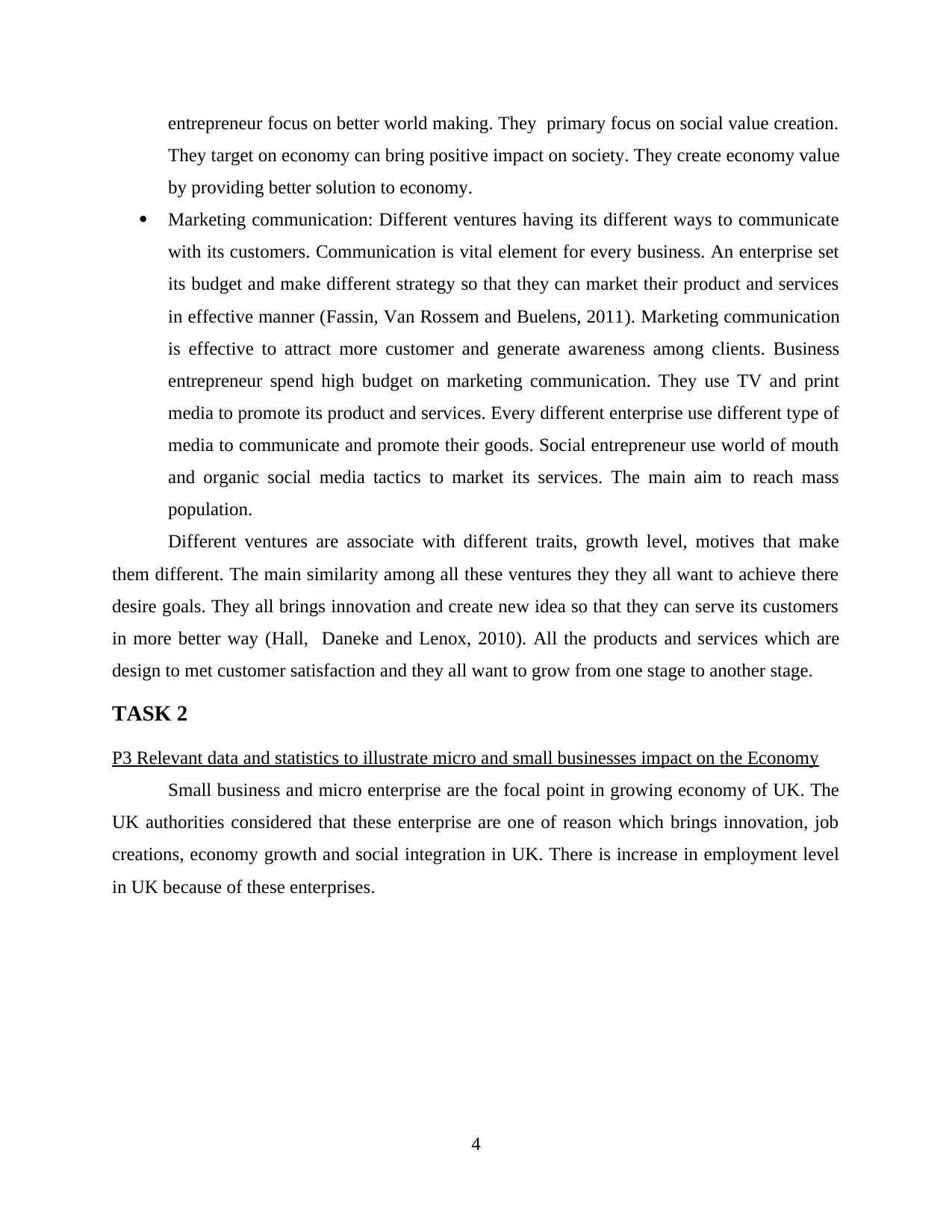
entrepreneur focus on better world making. They primary focus on social value creation.
They target on economy can bring positive impact on society. They create economy value
by providing better solution to economy.
Marketing communication: Different ventures having its different ways to communicate
with its customers. Communication is vital element for every business. An enterprise set
its budget and make different strategy so that they can market their product and services
in effective manner (Fassin, Van Rossem and Buelens, 2011). Marketing communication
is effective to attract more customer and generate awareness among clients. Business
entrepreneur spend high budget on marketing communication. They use TV and print
media to promote its product and services. Every different enterprise use different type of
media to communicate and promote their goods. Social entrepreneur use world of mouth
and organic social media tactics to market its services. The main aim to reach mass
population.
Different ventures are associate with different traits, growth level, motives that make
them different. The main similarity among all these ventures they they all want to achieve there
desire goals. They all brings innovation and create new idea so that they can serve its customers
in more better way (Hall, Daneke and Lenox, 2010). All the products and services which are
design to met customer satisfaction and they all want to grow from one stage to another stage.
TASK 2
P3 Relevant data and statistics to illustrate micro and small businesses impact on the Economy
Small business and micro enterprise are the focal point in growing economy of UK. The
UK authorities considered that these enterprise are one of reason which brings innovation, job
creations, economy growth and social integration in UK. There is increase in employment level
in UK because of these enterprises.
4
They target on economy can bring positive impact on society. They create economy value
by providing better solution to economy.
Marketing communication: Different ventures having its different ways to communicate
with its customers. Communication is vital element for every business. An enterprise set
its budget and make different strategy so that they can market their product and services
in effective manner (Fassin, Van Rossem and Buelens, 2011). Marketing communication
is effective to attract more customer and generate awareness among clients. Business
entrepreneur spend high budget on marketing communication. They use TV and print
media to promote its product and services. Every different enterprise use different type of
media to communicate and promote their goods. Social entrepreneur use world of mouth
and organic social media tactics to market its services. The main aim to reach mass
population.
Different ventures are associate with different traits, growth level, motives that make
them different. The main similarity among all these ventures they they all want to achieve there
desire goals. They all brings innovation and create new idea so that they can serve its customers
in more better way (Hall, Daneke and Lenox, 2010). All the products and services which are
design to met customer satisfaction and they all want to grow from one stage to another stage.
TASK 2
P3 Relevant data and statistics to illustrate micro and small businesses impact on the Economy
Small business and micro enterprise are the focal point in growing economy of UK. The
UK authorities considered that these enterprise are one of reason which brings innovation, job
creations, economy growth and social integration in UK. There is increase in employment level
in UK because of these enterprises.
4
⊘ This is a preview!⊘
Do you want full access?
Subscribe today to unlock all pages.

Trusted by 1+ million students worldwide

5
Paraphrase This Document
Need a fresh take? Get an instant paraphrase of this document with our AI Paraphraser
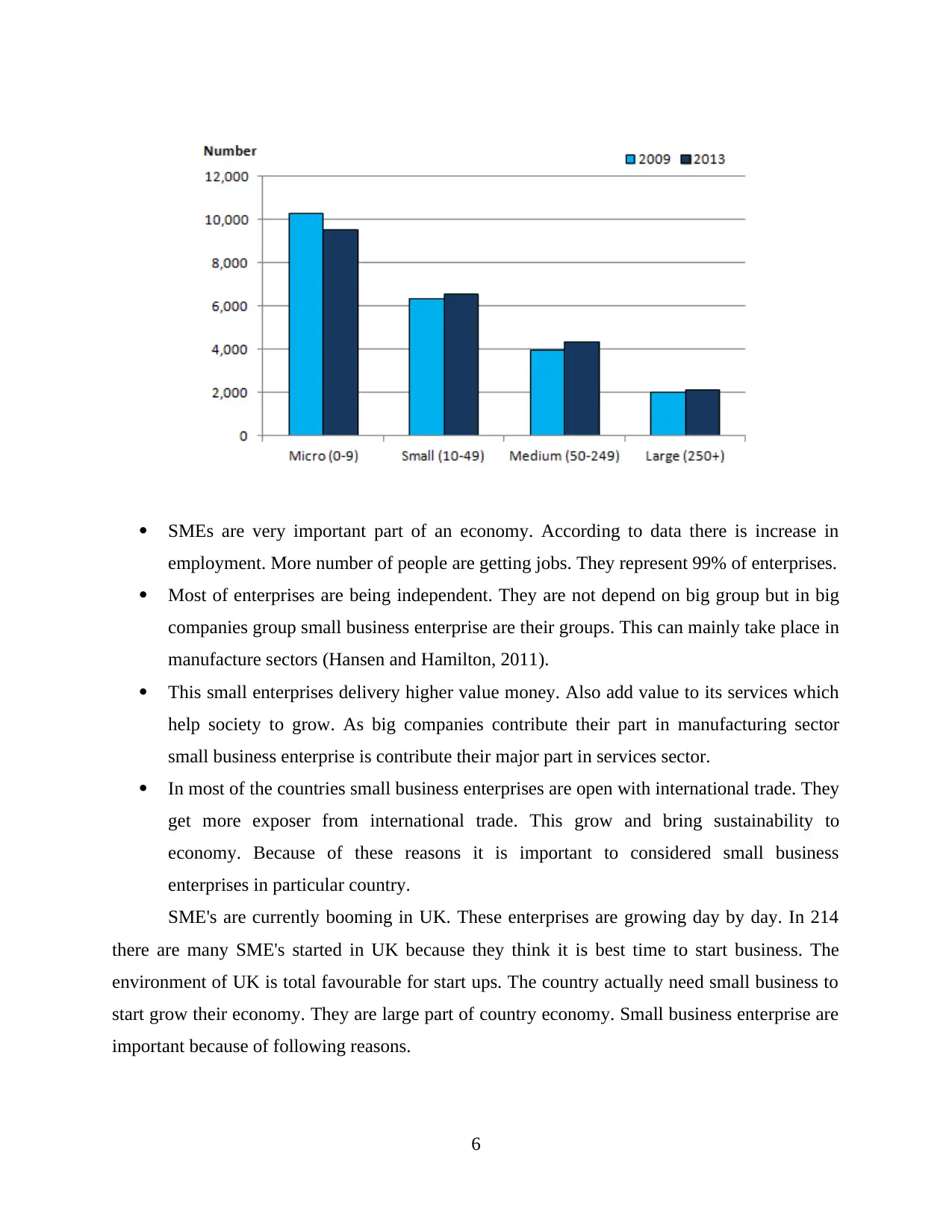
SMEs are very important part of an economy. According to data there is increase in
employment. More number of people are getting jobs. They represent 99% of enterprises.
Most of enterprises are being independent. They are not depend on big group but in big
companies group small business enterprise are their groups. This can mainly take place in
manufacture sectors (Hansen and Hamilton, 2011).
This small enterprises delivery higher value money. Also add value to its services which
help society to grow. As big companies contribute their part in manufacturing sector
small business enterprise is contribute their major part in services sector.
In most of the countries small business enterprises are open with international trade. They
get more exposer from international trade. This grow and bring sustainability to
economy. Because of these reasons it is important to considered small business
enterprises in particular country.
SME's are currently booming in UK. These enterprises are growing day by day. In 214
there are many SME's started in UK because they think it is best time to start business. The
environment of UK is total favourable for start ups. The country actually need small business to
start grow their economy. They are large part of country economy. Small business enterprise are
important because of following reasons.
6
employment. More number of people are getting jobs. They represent 99% of enterprises.
Most of enterprises are being independent. They are not depend on big group but in big
companies group small business enterprise are their groups. This can mainly take place in
manufacture sectors (Hansen and Hamilton, 2011).
This small enterprises delivery higher value money. Also add value to its services which
help society to grow. As big companies contribute their part in manufacturing sector
small business enterprise is contribute their major part in services sector.
In most of the countries small business enterprises are open with international trade. They
get more exposer from international trade. This grow and bring sustainability to
economy. Because of these reasons it is important to considered small business
enterprises in particular country.
SME's are currently booming in UK. These enterprises are growing day by day. In 214
there are many SME's started in UK because they think it is best time to start business. The
environment of UK is total favourable for start ups. The country actually need small business to
start grow their economy. They are large part of country economy. Small business enterprise are
important because of following reasons.
6
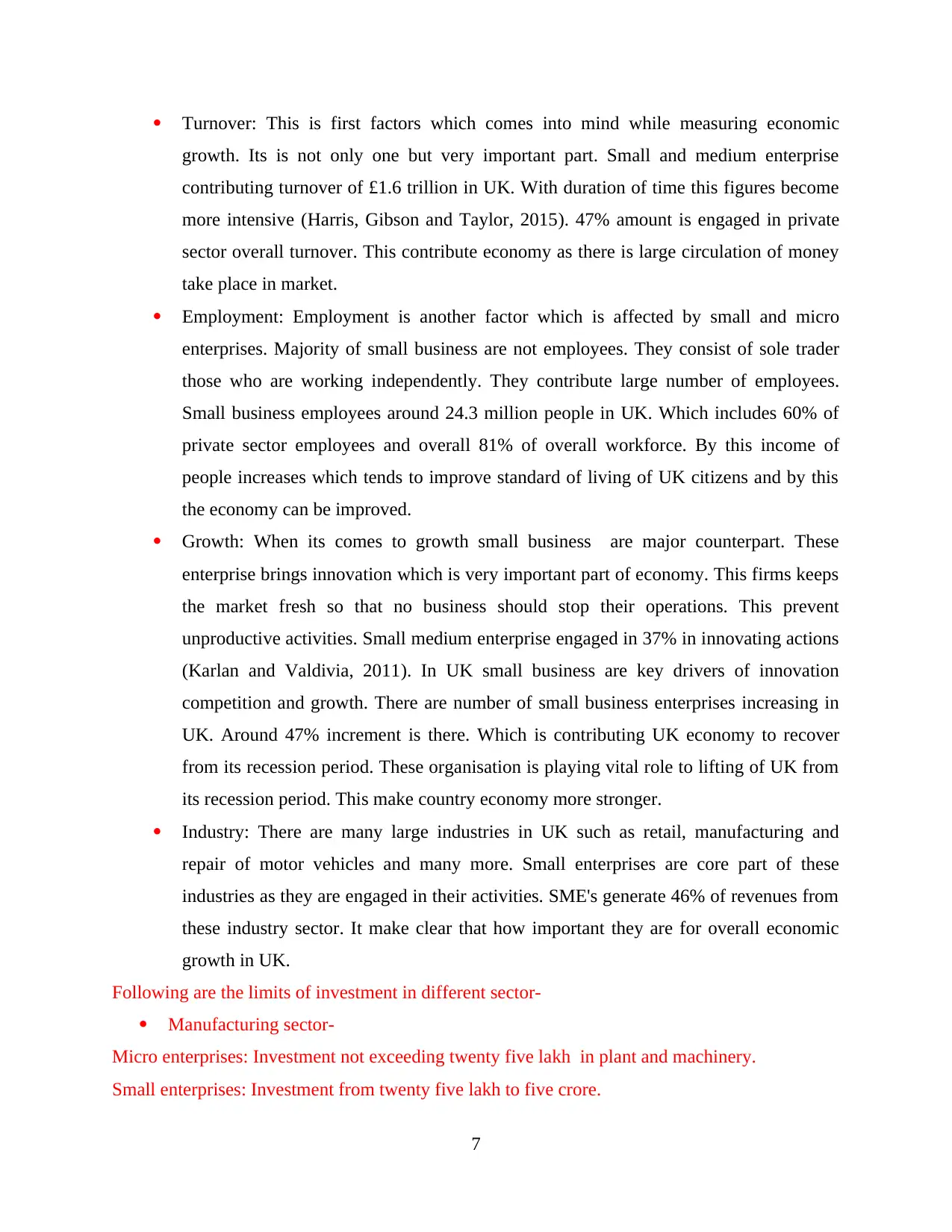
Turnover: This is first factors which comes into mind while measuring economic
growth. Its is not only one but very important part. Small and medium enterprise
contributing turnover of £1.6 trillion in UK. With duration of time this figures become
more intensive (Harris, Gibson and Taylor, 2015). 47% amount is engaged in private
sector overall turnover. This contribute economy as there is large circulation of money
take place in market.
Employment: Employment is another factor which is affected by small and micro
enterprises. Majority of small business are not employees. They consist of sole trader
those who are working independently. They contribute large number of employees.
Small business employees around 24.3 million people in UK. Which includes 60% of
private sector employees and overall 81% of overall workforce. By this income of
people increases which tends to improve standard of living of UK citizens and by this
the economy can be improved.
Growth: When its comes to growth small business are major counterpart. These
enterprise brings innovation which is very important part of economy. This firms keeps
the market fresh so that no business should stop their operations. This prevent
unproductive activities. Small medium enterprise engaged in 37% in innovating actions
(Karlan and Valdivia, 2011). In UK small business are key drivers of innovation
competition and growth. There are number of small business enterprises increasing in
UK. Around 47% increment is there. Which is contributing UK economy to recover
from its recession period. These organisation is playing vital role to lifting of UK from
its recession period. This make country economy more stronger.
Industry: There are many large industries in UK such as retail, manufacturing and
repair of motor vehicles and many more. Small enterprises are core part of these
industries as they are engaged in their activities. SME's generate 46% of revenues from
these industry sector. It make clear that how important they are for overall economic
growth in UK.
Following are the limits of investment in different sector-
Manufacturing sector-
Micro enterprises: Investment not exceeding twenty five lakh in plant and machinery.
Small enterprises: Investment from twenty five lakh to five crore.
7
growth. Its is not only one but very important part. Small and medium enterprise
contributing turnover of £1.6 trillion in UK. With duration of time this figures become
more intensive (Harris, Gibson and Taylor, 2015). 47% amount is engaged in private
sector overall turnover. This contribute economy as there is large circulation of money
take place in market.
Employment: Employment is another factor which is affected by small and micro
enterprises. Majority of small business are not employees. They consist of sole trader
those who are working independently. They contribute large number of employees.
Small business employees around 24.3 million people in UK. Which includes 60% of
private sector employees and overall 81% of overall workforce. By this income of
people increases which tends to improve standard of living of UK citizens and by this
the economy can be improved.
Growth: When its comes to growth small business are major counterpart. These
enterprise brings innovation which is very important part of economy. This firms keeps
the market fresh so that no business should stop their operations. This prevent
unproductive activities. Small medium enterprise engaged in 37% in innovating actions
(Karlan and Valdivia, 2011). In UK small business are key drivers of innovation
competition and growth. There are number of small business enterprises increasing in
UK. Around 47% increment is there. Which is contributing UK economy to recover
from its recession period. These organisation is playing vital role to lifting of UK from
its recession period. This make country economy more stronger.
Industry: There are many large industries in UK such as retail, manufacturing and
repair of motor vehicles and many more. Small enterprises are core part of these
industries as they are engaged in their activities. SME's generate 46% of revenues from
these industry sector. It make clear that how important they are for overall economic
growth in UK.
Following are the limits of investment in different sector-
Manufacturing sector-
Micro enterprises: Investment not exceeding twenty five lakh in plant and machinery.
Small enterprises: Investment from twenty five lakh to five crore.
7
⊘ This is a preview!⊘
Do you want full access?
Subscribe today to unlock all pages.

Trusted by 1+ million students worldwide
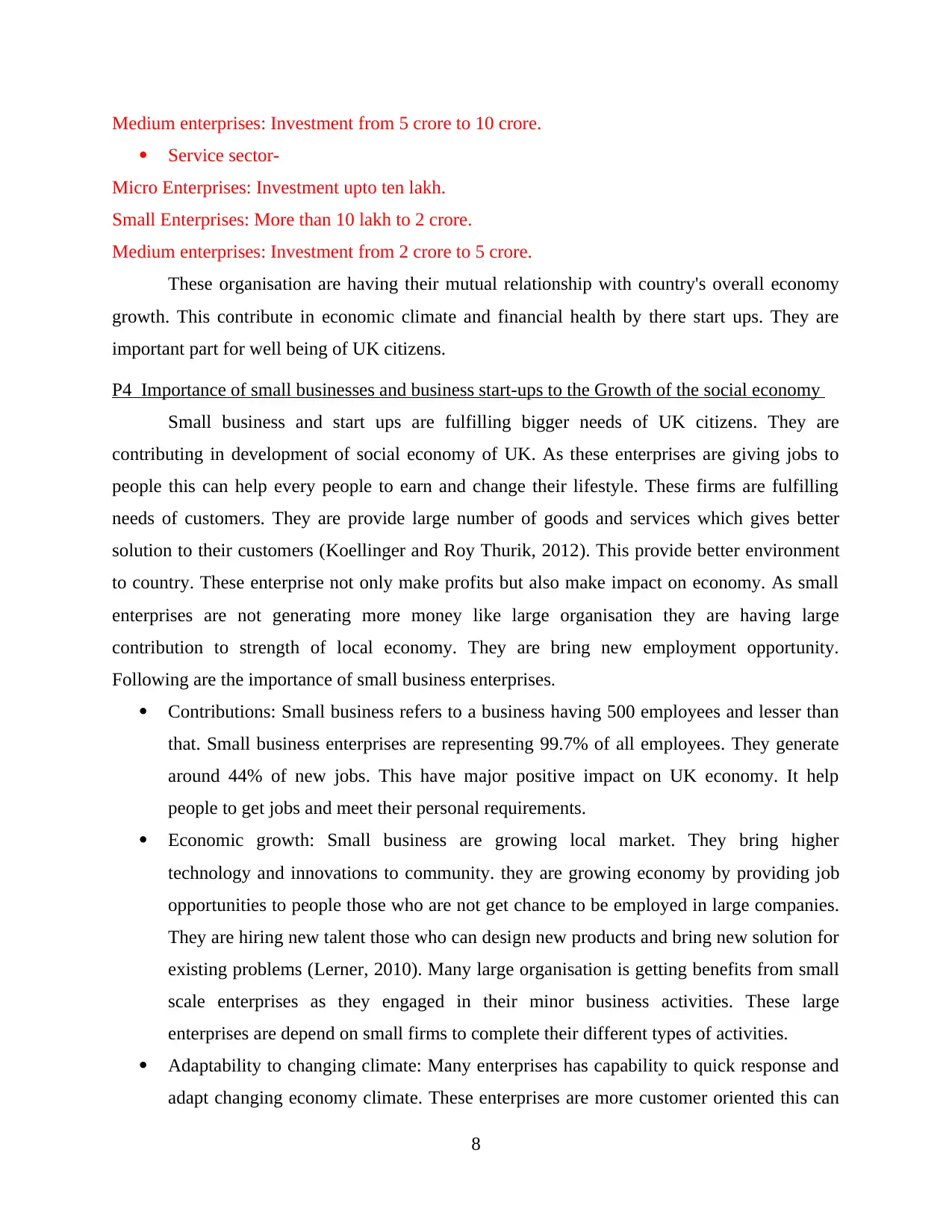
Medium enterprises: Investment from 5 crore to 10 crore.
Service sector-
Micro Enterprises: Investment upto ten lakh.
Small Enterprises: More than 10 lakh to 2 crore.
Medium enterprises: Investment from 2 crore to 5 crore.
These organisation are having their mutual relationship with country's overall economy
growth. This contribute in economic climate and financial health by there start ups. They are
important part for well being of UK citizens.
P4 Importance of small businesses and business start-ups to the Growth of the social economy
Small business and start ups are fulfilling bigger needs of UK citizens. They are
contributing in development of social economy of UK. As these enterprises are giving jobs to
people this can help every people to earn and change their lifestyle. These firms are fulfilling
needs of customers. They are provide large number of goods and services which gives better
solution to their customers (Koellinger and Roy Thurik, 2012). This provide better environment
to country. These enterprise not only make profits but also make impact on economy. As small
enterprises are not generating more money like large organisation they are having large
contribution to strength of local economy. They are bring new employment opportunity.
Following are the importance of small business enterprises.
Contributions: Small business refers to a business having 500 employees and lesser than
that. Small business enterprises are representing 99.7% of all employees. They generate
around 44% of new jobs. This have major positive impact on UK economy. It help
people to get jobs and meet their personal requirements.
Economic growth: Small business are growing local market. They bring higher
technology and innovations to community. they are growing economy by providing job
opportunities to people those who are not get chance to be employed in large companies.
They are hiring new talent those who can design new products and bring new solution for
existing problems (Lerner, 2010). Many large organisation is getting benefits from small
scale enterprises as they engaged in their minor business activities. These large
enterprises are depend on small firms to complete their different types of activities.
Adaptability to changing climate: Many enterprises has capability to quick response and
adapt changing economy climate. These enterprises are more customer oriented this can
8
Service sector-
Micro Enterprises: Investment upto ten lakh.
Small Enterprises: More than 10 lakh to 2 crore.
Medium enterprises: Investment from 2 crore to 5 crore.
These organisation are having their mutual relationship with country's overall economy
growth. This contribute in economic climate and financial health by there start ups. They are
important part for well being of UK citizens.
P4 Importance of small businesses and business start-ups to the Growth of the social economy
Small business and start ups are fulfilling bigger needs of UK citizens. They are
contributing in development of social economy of UK. As these enterprises are giving jobs to
people this can help every people to earn and change their lifestyle. These firms are fulfilling
needs of customers. They are provide large number of goods and services which gives better
solution to their customers (Koellinger and Roy Thurik, 2012). This provide better environment
to country. These enterprise not only make profits but also make impact on economy. As small
enterprises are not generating more money like large organisation they are having large
contribution to strength of local economy. They are bring new employment opportunity.
Following are the importance of small business enterprises.
Contributions: Small business refers to a business having 500 employees and lesser than
that. Small business enterprises are representing 99.7% of all employees. They generate
around 44% of new jobs. This have major positive impact on UK economy. It help
people to get jobs and meet their personal requirements.
Economic growth: Small business are growing local market. They bring higher
technology and innovations to community. they are growing economy by providing job
opportunities to people those who are not get chance to be employed in large companies.
They are hiring new talent those who can design new products and bring new solution for
existing problems (Lerner, 2010). Many large organisation is getting benefits from small
scale enterprises as they engaged in their minor business activities. These large
enterprises are depend on small firms to complete their different types of activities.
Adaptability to changing climate: Many enterprises has capability to quick response and
adapt changing economy climate. These enterprises are more customer oriented this can
8
Paraphrase This Document
Need a fresh take? Get an instant paraphrase of this document with our AI Paraphraser
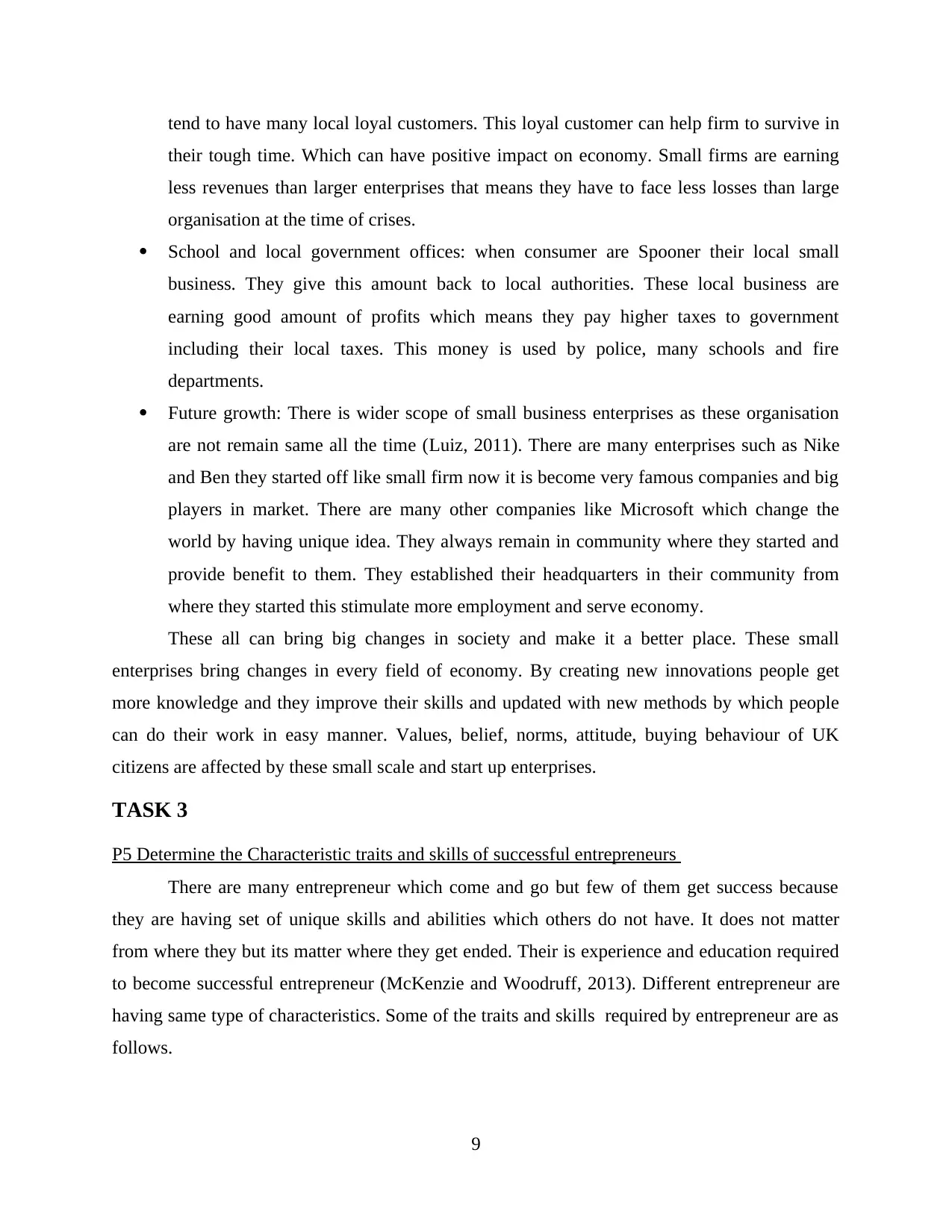
tend to have many local loyal customers. This loyal customer can help firm to survive in
their tough time. Which can have positive impact on economy. Small firms are earning
less revenues than larger enterprises that means they have to face less losses than large
organisation at the time of crises.
School and local government offices: when consumer are Spooner their local small
business. They give this amount back to local authorities. These local business are
earning good amount of profits which means they pay higher taxes to government
including their local taxes. This money is used by police, many schools and fire
departments.
Future growth: There is wider scope of small business enterprises as these organisation
are not remain same all the time (Luiz, 2011). There are many enterprises such as Nike
and Ben they started off like small firm now it is become very famous companies and big
players in market. There are many other companies like Microsoft which change the
world by having unique idea. They always remain in community where they started and
provide benefit to them. They established their headquarters in their community from
where they started this stimulate more employment and serve economy.
These all can bring big changes in society and make it a better place. These small
enterprises bring changes in every field of economy. By creating new innovations people get
more knowledge and they improve their skills and updated with new methods by which people
can do their work in easy manner. Values, belief, norms, attitude, buying behaviour of UK
citizens are affected by these small scale and start up enterprises.
TASK 3
P5 Determine the Characteristic traits and skills of successful entrepreneurs
There are many entrepreneur which come and go but few of them get success because
they are having set of unique skills and abilities which others do not have. It does not matter
from where they but its matter where they get ended. Their is experience and education required
to become successful entrepreneur (McKenzie and Woodruff, 2013). Different entrepreneur are
having same type of characteristics. Some of the traits and skills required by entrepreneur are as
follows.
9
their tough time. Which can have positive impact on economy. Small firms are earning
less revenues than larger enterprises that means they have to face less losses than large
organisation at the time of crises.
School and local government offices: when consumer are Spooner their local small
business. They give this amount back to local authorities. These local business are
earning good amount of profits which means they pay higher taxes to government
including their local taxes. This money is used by police, many schools and fire
departments.
Future growth: There is wider scope of small business enterprises as these organisation
are not remain same all the time (Luiz, 2011). There are many enterprises such as Nike
and Ben they started off like small firm now it is become very famous companies and big
players in market. There are many other companies like Microsoft which change the
world by having unique idea. They always remain in community where they started and
provide benefit to them. They established their headquarters in their community from
where they started this stimulate more employment and serve economy.
These all can bring big changes in society and make it a better place. These small
enterprises bring changes in every field of economy. By creating new innovations people get
more knowledge and they improve their skills and updated with new methods by which people
can do their work in easy manner. Values, belief, norms, attitude, buying behaviour of UK
citizens are affected by these small scale and start up enterprises.
TASK 3
P5 Determine the Characteristic traits and skills of successful entrepreneurs
There are many entrepreneur which come and go but few of them get success because
they are having set of unique skills and abilities which others do not have. It does not matter
from where they but its matter where they get ended. Their is experience and education required
to become successful entrepreneur (McKenzie and Woodruff, 2013). Different entrepreneur are
having same type of characteristics. Some of the traits and skills required by entrepreneur are as
follows.
9
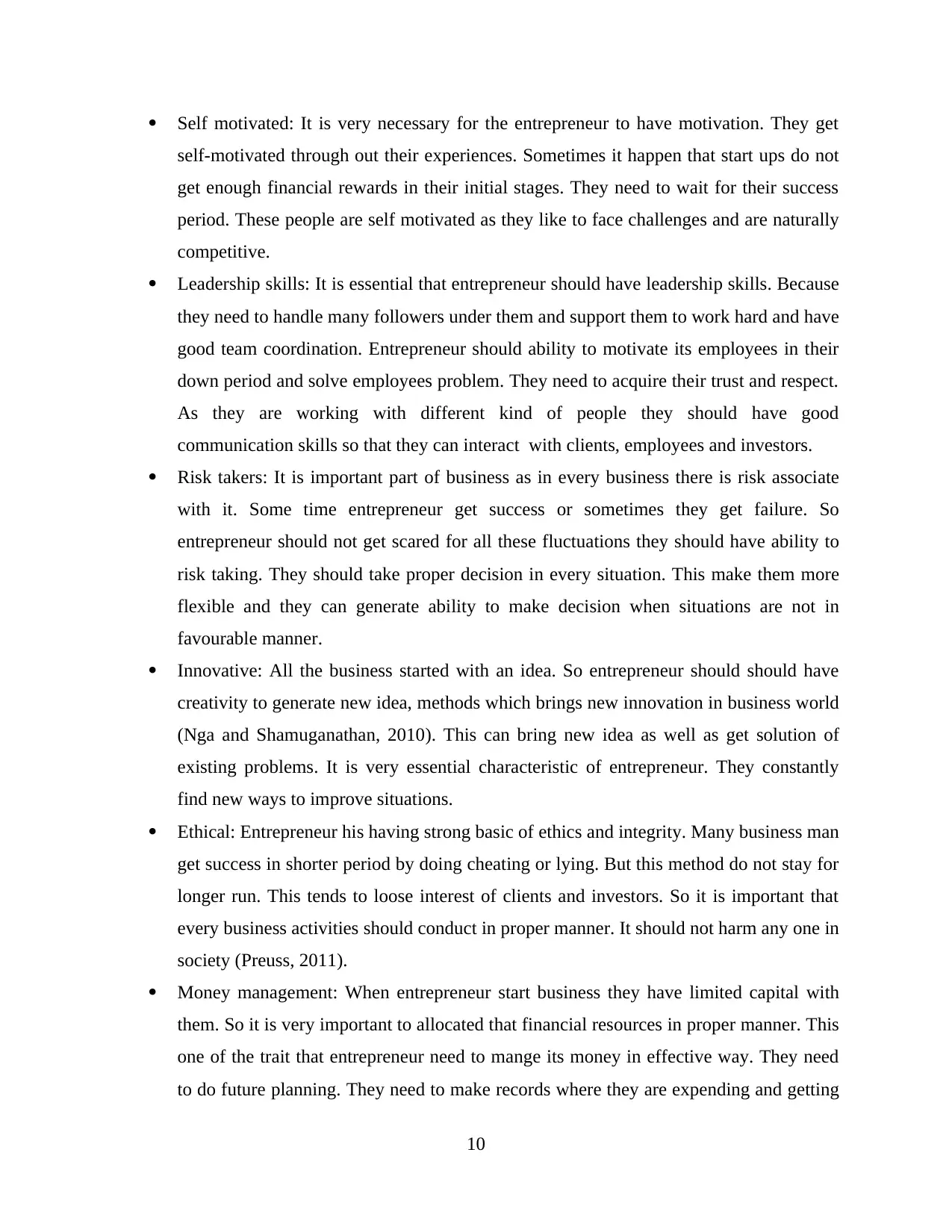
Self motivated: It is very necessary for the entrepreneur to have motivation. They get
self-motivated through out their experiences. Sometimes it happen that start ups do not
get enough financial rewards in their initial stages. They need to wait for their success
period. These people are self motivated as they like to face challenges and are naturally
competitive.
Leadership skills: It is essential that entrepreneur should have leadership skills. Because
they need to handle many followers under them and support them to work hard and have
good team coordination. Entrepreneur should ability to motivate its employees in their
down period and solve employees problem. They need to acquire their trust and respect.
As they are working with different kind of people they should have good
communication skills so that they can interact with clients, employees and investors.
Risk takers: It is important part of business as in every business there is risk associate
with it. Some time entrepreneur get success or sometimes they get failure. So
entrepreneur should not get scared for all these fluctuations they should have ability to
risk taking. They should take proper decision in every situation. This make them more
flexible and they can generate ability to make decision when situations are not in
favourable manner.
Innovative: All the business started with an idea. So entrepreneur should should have
creativity to generate new idea, methods which brings new innovation in business world
(Nga and Shamuganathan, 2010). This can bring new idea as well as get solution of
existing problems. It is very essential characteristic of entrepreneur. They constantly
find new ways to improve situations.
Ethical: Entrepreneur his having strong basic of ethics and integrity. Many business man
get success in shorter period by doing cheating or lying. But this method do not stay for
longer run. This tends to loose interest of clients and investors. So it is important that
every business activities should conduct in proper manner. It should not harm any one in
society (Preuss, 2011).
Money management: When entrepreneur start business they have limited capital with
them. So it is very important to allocated that financial resources in proper manner. This
one of the trait that entrepreneur need to mange its money in effective way. They need
to do future planning. They need to make records where they are expending and getting
10
self-motivated through out their experiences. Sometimes it happen that start ups do not
get enough financial rewards in their initial stages. They need to wait for their success
period. These people are self motivated as they like to face challenges and are naturally
competitive.
Leadership skills: It is essential that entrepreneur should have leadership skills. Because
they need to handle many followers under them and support them to work hard and have
good team coordination. Entrepreneur should ability to motivate its employees in their
down period and solve employees problem. They need to acquire their trust and respect.
As they are working with different kind of people they should have good
communication skills so that they can interact with clients, employees and investors.
Risk takers: It is important part of business as in every business there is risk associate
with it. Some time entrepreneur get success or sometimes they get failure. So
entrepreneur should not get scared for all these fluctuations they should have ability to
risk taking. They should take proper decision in every situation. This make them more
flexible and they can generate ability to make decision when situations are not in
favourable manner.
Innovative: All the business started with an idea. So entrepreneur should should have
creativity to generate new idea, methods which brings new innovation in business world
(Nga and Shamuganathan, 2010). This can bring new idea as well as get solution of
existing problems. It is very essential characteristic of entrepreneur. They constantly
find new ways to improve situations.
Ethical: Entrepreneur his having strong basic of ethics and integrity. Many business man
get success in shorter period by doing cheating or lying. But this method do not stay for
longer run. This tends to loose interest of clients and investors. So it is important that
every business activities should conduct in proper manner. It should not harm any one in
society (Preuss, 2011).
Money management: When entrepreneur start business they have limited capital with
them. So it is very important to allocated that financial resources in proper manner. This
one of the trait that entrepreneur need to mange its money in effective way. They need
to do future planning. They need to make records where they are expending and getting
10
⊘ This is a preview!⊘
Do you want full access?
Subscribe today to unlock all pages.

Trusted by 1+ million students worldwide
1 out of 18
Related Documents
Your All-in-One AI-Powered Toolkit for Academic Success.
+13062052269
info@desklib.com
Available 24*7 on WhatsApp / Email
![[object Object]](/_next/static/media/star-bottom.7253800d.svg)
Unlock your academic potential
Copyright © 2020–2026 A2Z Services. All Rights Reserved. Developed and managed by ZUCOL.





